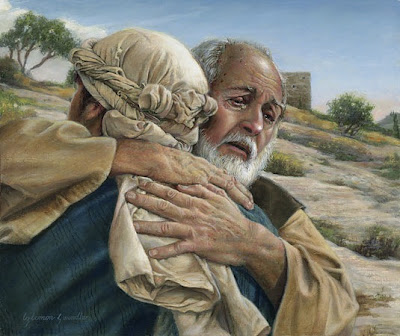Reconciliation + the Prodigal Son
I mentioned to them an element of interpretation of the Prodigal Son story that came to me in prayer during my annual retreat in February. Here is the end of the parable:
While he was still a long way off, his father saw him and was moved with pity. He ran to the boy, clasped him in his arms and kissed him. Then his son said, “Father, I have sinned against heaven and against you. I no longer deserve to be called your son.” But the father said to his servants, “Quick! Bring out the best robe and put it on him; put a ring on his finger and sandals on his feet. Bring the calf we have been fattening, and kill it; we will celebrate by having a feast, because this son of mine was dead and has come back to life; he was lost and is found.” And they began to celebrate.

Now the elder son was out in the fields, and on his way back, as he drew near the house, he could hear music and dancing. Calling one of the servants he asked what it was all about. The servant told him, “Your brother has come, and your father has killed the calf we had been fattening because he has got him back safe and sound.” He was angry then and refused to go in, and his father came out and began to urge him to come in; but he retorted to his father, “All these years I have slaved for you and never once disobeyed any orders of yours, yet you never offered me so much as a kid for me to celebrate with my friends. But, for this son of yours, when he comes back after swallowing up your property—he and his loose women—you kill the calf we had been fattening.” The father said, “My son, you are with me always and all I have is yours. But it was only right we should celebrate and rejoice, because your brother here was dead and has come to life; he was lost and is found.”
What suddenly struck me was the way the different characters address each other. The youngest son had asked his father for his inheritance, basically acting as if he wanted his father dead, or at least couldn't wait till his father died to receive what was due to him. And yet, when he returns he still acknowledges him as his father, but is ready to accept the punishment of being, in a sense, demoted from sonship to servanthood (“Father, I have sinned against heaven and against you. I no longer deserve to be called your son”). But the father has already shown him unshakeable love (While he was still a long way off, his father saw him and was moved with pity. He ran to the boy, clasped him in his arms and kissed him.), and though he doesn't address him directly as "son" he certainly acts as if he still accepts him as such and indeed says to his servants, "this son of mine was dead and has come back to life; he was lost and is found.”
Now compare this to the behaviour of the eldest son. He is indignant at the generous treatment afforded his brother ("this son of yours") and one might indeed feel sympathy for him. But look again... he doesn't actually address his father as "father" and says of his brother "this son of yours". It is as if he is unrelated to either of them, just a paid servant; ironically what the youngest son was prepared to accept as punishment. And yet, the father says to him, “My son, you are with me always and all I have is yours." It would seem that despite his own sin, the youngest son comes to recognise - in humility - his need of his father, of his love, of his forgiveness and of the security and stability that even just working for him as a servant would afford him. Yet, the eldest son does not acknowledge such a need. He is convinced of his own righteousness (a reference perhaps to the self-righteous attitudes of much of the Jewish hierarchy in Jerusalem) and feels that he deserves reward for doing basically what a paid servant could have done for him, i.e. what is just his duty. But his heart is not in it. He does not acknowledge his need of his father, nor seem to accept his position as his son. In a lack of humility, he does not accept to enter into a love relationship of father-son. Though the offer will always be there from the father ("My son..."). So there is hope for him, just as there is hope for all of us who turn away from God and, like Peter, deny that we know him.

Comments
I really think that means you hit your target audience.
Thank you again.